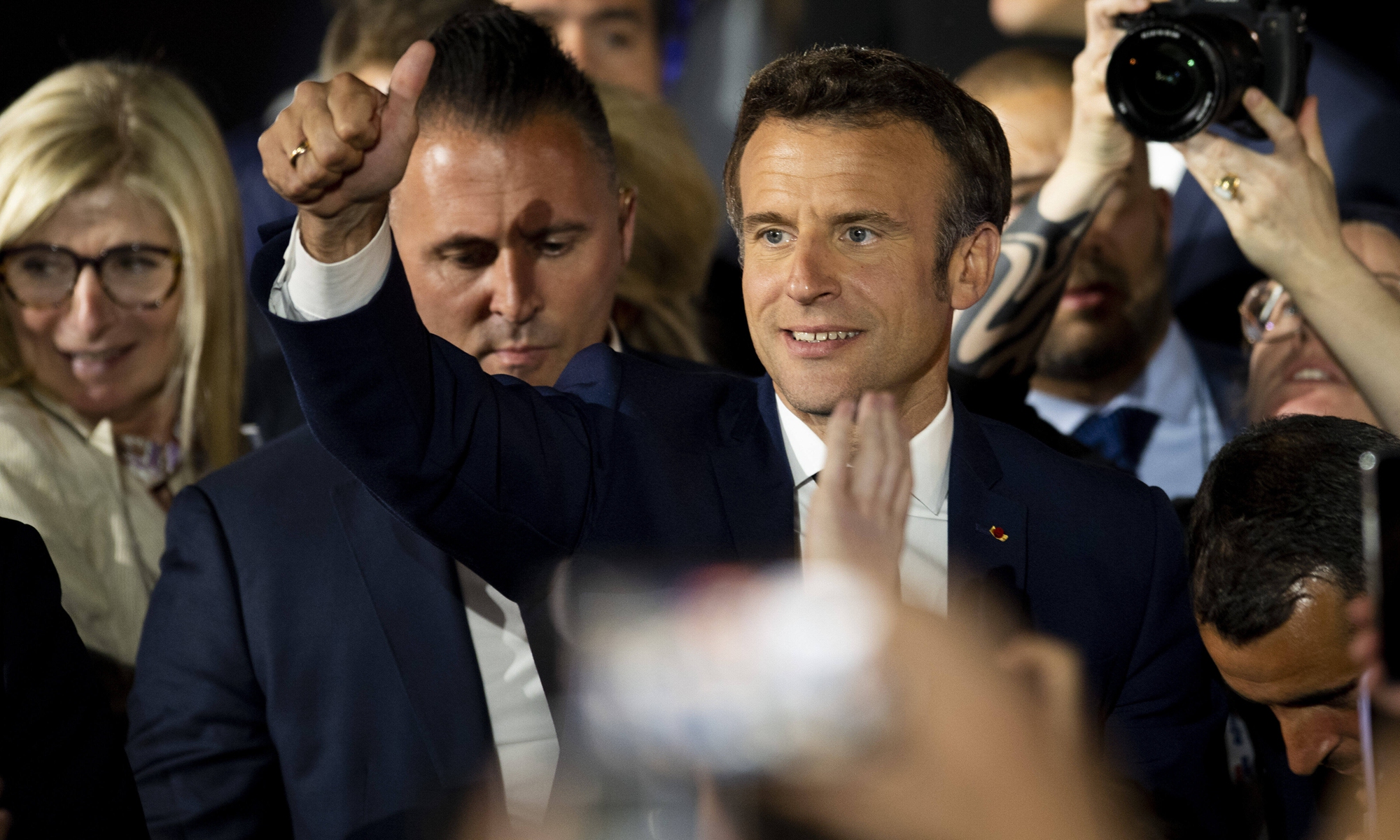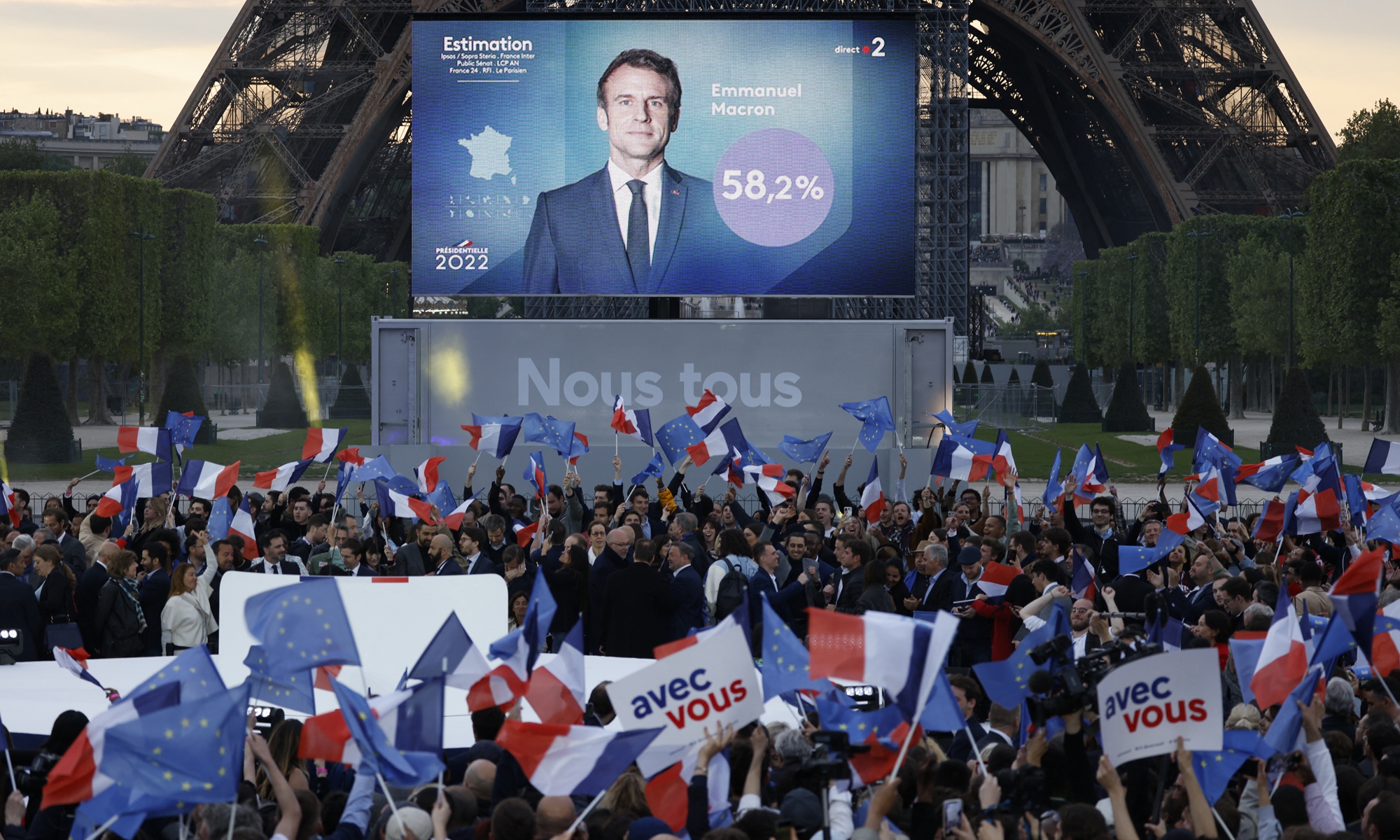
French President Emmanuel Macron delivers his victory speech in Paris, France, on April 24, 2022. Photo: VCG
Chinese President Xi Jinping on Monday congratulated French President Emmanuel Macron for his reelection victory. Xi gave high credit to the development of bilateral relations in the past five years under Macron's governance, and stressed that the stable development of ties has grown more prominent amid the increasingly complicated international atmosphere.
Observers believe that in his second term, Macron will try to lead France, as well as the EU, to seek more strategic autonomy, and continue to seek cooperation with China, as alienating Russia has put France and the EU in dire need of cooperation with others, especially China.
Macron's victory is also a relief for the EU and the US, which were concerned that a victory for his far-right competitor would splinter EU unity and send political shockwaves throughout the continent. However, Chinese observers predicted Macron's victory will hardly guarantee him or France the power to further solidify the bloc as it faces "divergence on principles" brought about by the Russia-Ukraine conflict.
The widely watched French election came to a close on Sunday with Macron taking 58.55 percent of the vote, fending off the challenge from his far-right opponent Marine Le Pen. This also made Macron the first French leader to get reelected as president in 20 years.
Xi on Monday sent a congratulatory message to Macron. In his message, Xi said that over the past five years, the China-France comprehensive strategic partnership has maintained a high level of development under the guidance of the two heads of state.
The two sides have continued to deepen practical cooperation in various fields, combated the COVID-19 pandemic shoulder to shoulder, jointly upheld multilateralism and improved global governance, injecting new impetus into the development of China-European Union relations and making new contributions to world peace, stability and prosperity, Xi said.
Speaking on Macron's victory, Chinese Foreign Ministry spokesperson Wang Wenbin also said that China is willing to work with France, and other EU countries, to deepen the strategic partnership between China and the bloc, to inject much needed stability and positive energy into the turbulent world.
Macron's victory has eased the anxiety of Western powers, which feared the election of a nationalist, eurosceptic Le Pen would have wreaked havoc on the unity of EU, as well as the West's anti-Russia alliance, as Le Pen has been a vocal supporter of Russian President Vladimir Putin.
In what Reuters called a "sign of relief," European leaders were quick to congratulate Macron on his victory. German Chancellor Olaf Scholz was the first foreign leader to call Macron and congratulate him on his reelection, France 24 quoted Scholz's office as saying. "Your voters have sent a strong vote of confidence in Europe today. I am happy that we will continue our good cooperation," Scholz wrote on Twitter.
European Council president Charles Michel and the prime ministers of Belgium and Luxembourg were also among the first group to congratulate Macron, followed by almost all of the bloc's 27 leaders.
Putin also sent Macron a message of congratulations, Russian news agencies quoted the Kremlin as saying.
US President Joe Biden congratulated Macron on his reelection Sunday (US time), calling France a "key partner in addressing global challenges."
However, Chinese observers said that the increasing number of voters who cast their ballots for Le Pen, who takes a hostile stance against the EU and NATO, should ring alarm bells for those two blocs, as it signals rising dissatisfaction against them among the general public in France, one of the EU's most pivotal countries.
According to Bloomberg, Le Pen got around 2.9 million more votes than in 2017, when she also faced Macron in the presidential run-off, while Macron lost about 2 million votes.
With former German chancellor Angela Merkel bowing out of political life, the onus falls on Macron to take up the mantle of European leadership and seek a more independent EU, said Cui Hongjian, director of the Department of European Studies at the China Institute of International Studies. However, the French president may find the task an extremely difficult one, as the Russia-Ukraine conflict showed that the divergences among EU countries are not only about their interests, but also about their principles.
Divergences remain between countries such as Germany and France and among Eastern European countries in their reaction to Russia over the Ukraine crisis. For example, countries such as Germany and France advocate solving the crisis via dialogue and are more reluctant to slap tough sanctions as they may backfire, and Eastern European countries, such as Poland, are all for a tough response against Russia, said experts.
Observers also noted that the current crisis will only deepen differences among European countries over strategic autonomy - countries such as France and Germany support the concept while some Eastern European countries disagree amid concerns they may lose defensive support from the US.
"There's little room for Macron, or France, to strengthen the unity of the bloc given the rising problems, unless it finds a new mechanism, because the old way clearly doesn't work well," said Cui.

Supporters cheer after the victory of Emmanuel Macron in France's presidential election, at the Champ de Mars, in Paris, on April 24, 2022. Photo: AFP
Embracing autonomy Zheng Ruolin, a senior Chinese media professional and European studies expert who has lived in France for several years, expected Macron to roll out a slew of important policies in his second term, such as keeping its distance with the US, continuing to seek cooperation with China and being proactive toward Russia.
Zheng told the Global Times that he also believed Macron's first visit to Asia will be to China, just as it was when he won the presidential election five years ago.
In his congratulatory message to Macron, Xi also emphasized that both China and France are major countries with a tradition of staying independent. Xi said the strategic significance of the sound and stable development of China-France relations has become ever more prominent as the international situation is undergoing profound and complex changes.
In the latest bilateral exchanges between leaders of the two countries in February, Macron said in a phone conversation that during its rotating presidency of the Council of the EU in the first half of this year, France will make all-out efforts to advance the positive agenda between the EU and China, and work together with China to ensure the success of the EU-China Leaders' Meeting and push forward the development of EU-China relations. France hopes that progress will be made in the ratification and entry into force of the EU-China investment agreement.
Song Luzheng, a France-based research fellow at the China Institute, Fudan University, said that Macron is a firm supporter of strategic autonomy and it is not difficult for him to see that what EU currently needs is to reduce its dependence on the US. In this way, France and the whole of EU, when facing the risk of cutting themselves off from Russia, are in even greater need of China.
Song is also optimistic that during Macron's second term, China-France and China-EU relations will see some breakthroughs.
However, the prospects are far from bright. Since the start of the Russia-Ukraine conflict, some European politicians have been pressuring China to vocally criticize Russia, despite China's repeated call to not add fuel to the fire and to promote dialogue. Other disputes have also cast a shadow over bilateral ties, such as EU's criticism of China's response to Lithuania after the tiny Baltic country touched on China's red-button Taiwan question.
Moreover, the China-EU Comprehensive Agreement on Investment was stalled by the unilateral freeze undertaken by the European Parliament in May 2021.
But despite these challenges, economic and trade ties between the two remain strong and continue to expand. In the first two months of 2022, the EU surpassed ASEAN as China's biggest trading partner after losing the spot in 2021, as trade between China and the EU surged 14.8 percent year-on-year to $137.16 billion.
The conflicts exist and will be there in the future, but China and EU have established a smooth dialogue mechanism that enables the two to negotiate through those problems, said experts.
They noted that the EU needs to realize that at a strategic level, China and the bloc need each other, and for such cooperation to work smoothly, bilateral relations should not be disrupted by issues such as Ukraine, Lithuania and ideological issues.





